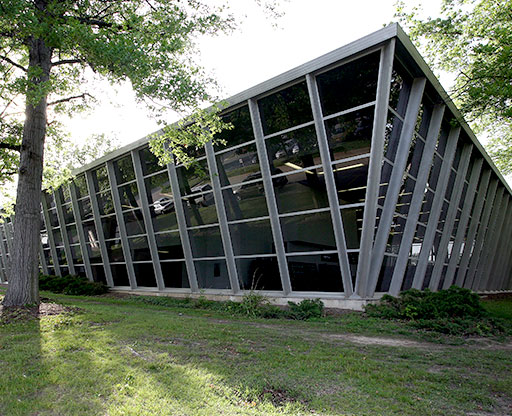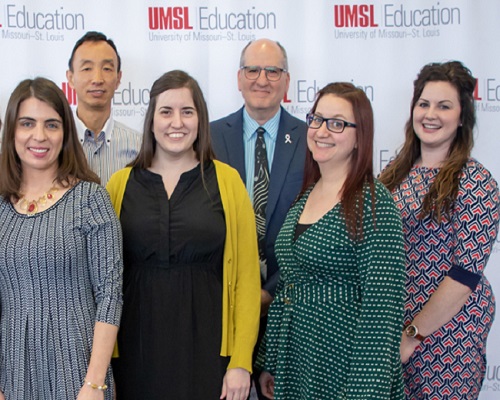Reimagine Education and Drive Progress with an Ed.D. in Educational Practice
The Doctor of Education program (Ed.D.) with an emphasis in Educational Practice provides an accelerated doctoral experience that is intended for practitioners who want to build professional connections and transform educational practice. This program emphasizes action research, which allows students to apply their learning to real-world educational practices. The program is structured to leverage the benefits of this collaborative and action-oriented approach to help students achieve their doctoral goals more efficiently and effectively.
Program type:
Doctorate, EdD
Format:
Online
Take the next step
Request more information below:

Doctor of Education, Educational Practice
Students are admitted to the EdD program and simultaneously to a Learning Community of Practice that is formed around a central theme. The learning communities typically begin during the fall semester and members of the learning community advance through the program together as a cohort and complete the degree requirements within 3 to 3½ years. A Dissertation in Practice is the culminating capstone project.
There are Learning Communities that offer the collaborative dissertation option to investigate a high-impact Problem of Practice. The research experience would encompass the scholarly process of conducting research and possibly working with community stakeholders and reviewing extant data related to the Problem of Practice.
More information about each pathway is available in the degree information section below.
Outcomes and Career Outlook
- Design equitable, ethical, and socially just solutions to complex problems in educational practices.
- Apply educational practice knowledge to positively impact individuals, families, organizations, and communities.
- Collaborate effectively with diverse communities and build partnerships through strong communication skills.
- Integrate practical and research knowledge to conduct systemic and systematic inquiry in educational practice.
- Create solutions to problems of practice by using professional knowledge and practices related to educational practice.
- Develop and participate in communities of practice, recognizing their value and function.
- Utilize critical reflective practice to implement change in professional practice and educational practice organizations.
This program is not aligned to state certification standards.
Employment of Education Practitioners is projected to grow up to 4% to 2030, with a median annual salary of $98,490, according to wage and employment data from the Bureau of Labor Statistics.
98,490
4
Career Opportunities
- Director of Academic Affairs
- College/University President
- Training & Development Manager
- Human Resources Manager
- Curriculum Developer
- Grant Writer
- Education Policy Analyst
- Educational Researcher
- Director of Education
- Chief Learning Officer
- Director of Learning & Development
Applicants should be admitted to the Graduate School. Additional requirements for admission to the EdD program:
- Submit the EdD Supplemental Application
- Two Letters of Recommendation
- Statement of Purpose – In the statement of purpose please describe how the EdD Degree aligns with your career and professional goals and why you would like to pursue your chosen Learning Community.
- Submit a current professional resume/CV.
- Attend an interview with the mentor team.
International students are required to document English proficiency by providing scores from an internationally accepted standardized examination before a decision is made on admission.
Application Deadline
Application materials should be submited by April 1 for a fall cohort start.
College Access, Career Readiness and Student Services in Higher Education
The College Access/Career Readiness and Student Support Services in Higher Education Learning Community is an online learning program that is committed to student immersion in high-impact educational practice. We will explore systems thinking, strategic planning, leadership, collaboration strategies and more to understand the intersectionality among these components and their impact on sense-making within educational institutions. These efforts contribute to the development of philosophical ideologies that shape organizational identity, culture and institutional priorities. Deepening our understanding of the interaction among such organizational efforts will inform our work as we contemplate the philosophical underpinnings that serve as the foundation for the student services profession and promoting student success in educational institutions.
We will specifically explore how organizational ideologies, institutional priorities and culture impact college access and student services in K-12 and postsecondary institutions. Holistic student support and promoting student success is at the core of the mission of all educational institutions. A unique and dynamic synergism will be operationalized if all educational systems are aligned to support the work and collaboration of practitioner professionals across all educational systems who advocate for student support and success.
There will be a targeted emphasis on an interconnected systems approach relative to K-12 and postsecondary educational systems and academic and student affairs professionals, as well as pre-collegiate preparation, student support services and college access/transition, equity and affordability. If you are a Practitioner-Leader who would like to enhance your career as an educational professional to solve organizational issues that impact student success and the student services professional, you have arrived!
Who should apply?
Current and aspiring practitioners who are interested in a staff position, middle-level management or an executive role in 2- and 4- year colleges and universities and/or have an interest in college access; and K-12 practitioners interested in pre-collegiate preparation and college access for K-12 students who will pursue postsecondary education attainment
NOTE: Administrative certification is not affiliated with this program.
Career Options
The available possible career options would include the following roles in K-12 education and postsecondary education, with the addition of leadership positions in higher education, student services, and college and career readiness.
K-12:
- K-12 College and Career Coach
- K-12 Student Advocacy, Victimization, and Trauma Support Professional
- College Readiness Professional (College Bound/AmeriCorps, Wyman Center, College Advising Corps)
- Educational Liaison for K-12 and Postsecondary Education
- Independent College and Career Readiness Leader (private practice)
- Adult and Youth Development Agencies
Postsecondary Education:
- Precollegiate Programming (TRIO, Bridge, Talent Search, Upward Bound, etc.)
- Student Services (Multicultural Student Services, Precollegiate Programs, Residential Life, Financial Aid, Student Activities, Student Conduct, Admissions and Recruitment, Disability Access Services, etc.)
- Academic Affairs (Academic Advising, Registration, Student Conduct, Research Compliance, Grants and Contracts, Alumni Development and Fundraising, Institutional Research, Faculty Development and Support, etc.)
- College Access/Career Readiness Policy Development (with State and Federal Agencies such as MDHEWD and U.S. Dept. of Education, Office of Postsecondary Education)
Social Justice in Education
The Social Justice in Education Learning Community is a distance learning program (100% online) that will explore the everyday politics of racial injustice and the myriad of ways to remedy such circumstances. The learning community will be drawn from today’s activists, whether they’ve considered themselves such or not. Cohort members will examine the historical roots of racialized oppression in education to empower them to think critically about current practices so they can promote equity and justice. The learning community cohort members will work collaboratively in teams to develop their dissertation research projects.
The themes for the learning community will be:
- The learning community, through counter-public modeling, will engage in the deliberations needed to create a community of practice to further this enterprise.
- Members of this learning community will learn to exhibit the "radical hope" necessary to carry realized decisions of racial justice to fruition.
- Third, this learning community will deeply examine critical counter-storytelling to build the "Black study" theorizing necessary for such an endeavor.
- This learning community will perform "radical dreaming" toward embodied humanity that was a staple of Black classrooms of the past. In this way, we can collectively revive DuBois’ vision of a "New Dawn" of learning possibilities for self-deterministic students of color and their teachers.
Who should apply?
The co-directors of this learning community welcome adult learners from non-traditional as well as traditional educational backgrounds to apply to this program.
Education Leadership, Ed.D. and Ed.S. Dual Completion
Wherever you are in your educational leadership journey, UMSL has a path to move you forward. Through our Educational Leadership One+Two Degree Completion Program, we have opportunities for individuals who already have principal certification to complete an approved superintendent certification program and a doctoral degree.
Our Education Leadership One+Two Degree Completion Program is a three-year program combining the Ed.S. in education administration and the Ed.D. in educational practice degree programs. In year one, students will complete the 27 credit hours of required coursework for superintendent certification. In year two, students will begin research methods and prepare to complete the doctoral dissertation. In year three, students complete the dissertation. In total, students will complete a minimum of 54 credit hours past their master’s degree.
Already have an Ed.S. or superintendent certification? Don’t worry, we have a pathway for you, too!
| If you have.... | |
|---|---|
| a Master’s in education administration and you are seeking superintendent certification: | Apply for the Ed.S. program. You can complete the Ed.S. with superintendent certification in a year. Upon graduation, you can enter the two year Ed.D. completion program. This is a 1+2 year program comprised of 54 total credit hours. |
| an Ed.S. degree in education administration and you are seeking superintendent certification: | Apply for the Ed.D. program. You will take the superintendent certification coursework during your first year. This is a 3 year program of study comprised of 54 total credit hours. |
| an Ed.S. degree in education administration and you are NOT seeking superintendent certification: | Apply for the Ed.D. program. You will move directly to the 27 credit hour Ed.D. completion program of study. This is a 2 year program. |
*Please note that the superintendent program is an approved plan of study by DESE. To be eligible for certification, you must also meet the minimum number of years of experience as a principal and pass all required certification exams.
**Students with degrees from other universities will have to meet institutional residency requirements which may impact credit hours.
Plan of study
Review Full Degree RequirementsNon-Missouri Residents: Prospective students are responsible for reviewing the NC-SARA state authorizations page to see if this program is offered in their state throughout their program and to review the licensure or certification requirements for the state in which they reside.
Connect with likeminded business students and professionals though one of our student organizations.
Career Services - Students have access to professional career counselors who can assist in everything from resume development and interview preparation to lining up an internship or connecting you with your next fulltime career. UMSL alumni also enjoy high quality, lifelong career management programming, services, events and resources to assist in all phases of career development.
Research - There are many opportunities for graduate students to showcase their research including our annual Graduate Research Fair, which is open to students from all graduate programs. Doctoral and thesis master’s students can also compete in the Three Minute Thesis challenge to be evaluated by a panel of judges for a chance to win cash prizes.








